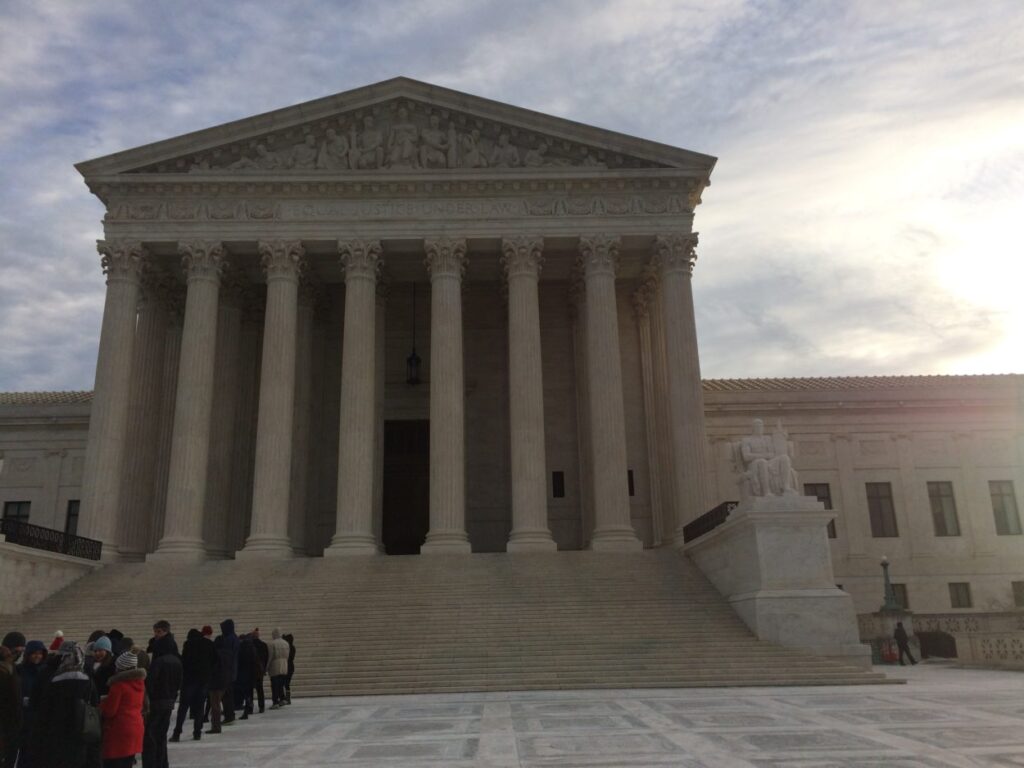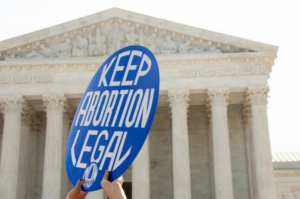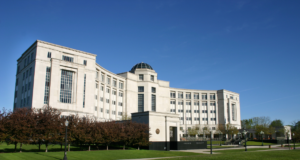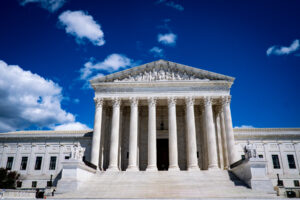How the Supreme Court’s ruling on abortion rights this term could affect LGBTQ+ rights
5 min read
This fall, the U.S. Supreme Court is hearing oral arguments on anti-abortion bans that some say could have the potential to impact LGBTQ+ constitutional rights.
The Supreme Court heard oral arguments earlier this month for two cases filed over Texas SB 8, which prohibits abortion at six weeks. On December 1, the Supreme Court will hear another case, Dobbs v. Jackson Women’s Health Organization, over the right of Mississippi to ban abortion at 15 weeks.
Many rights that involve bodily autonomy, such as the right to contraception, the right to abortion and the right for same sex couples to marry, rest on the Supreme Court’s interpretation of the 5th and 14th amendments.
“In the due process clauses of the 5th and 14th amendments there’s this protection of process when the government deprives us of life, liberty and property. The liberty interest interpreted by the Supreme Court includes some unspecified rights, called due process rights,” University of New Mexico School of Law Professor Maryam Ahranjani told NM Political Report.
Abortion rights and LGBTQ+ rights have fallen under the court’s interpretation of due process rights, Ahranjani said.
This is what is worrisome for some LGBTQ+ activist such as Marshall Martinez, executive director of Equality New Mexico.
“There is a real possibility that if this court said Roe was wrongly decided, it never gave us the right to privacy, then there could be other challenges,” Martinez said.
Several of the Supreme Court justices asked questions around this issue when the court heard Texas SB 8. Texas SB 8 is not enforced by the state of Texas but rather by individuals or groups who suspect a clinic of providing abortion after six weeks or others who “aid or abet” a pregnant person receiving an abortion.
Justice Sonia Sotomayor questioned the implications for other constitutional rights such as marriage equality, same sex sexual activity and contraceptive use, during oral argument on Texas SB 8. All of these constitutional rights were won through the court over the past 56 years.
“So this is not limited to abortion. That’s the point that’s been raised. It’s limited to any law that a state thinks it’s dissatisfied with,” Sotomayor said.
Laura Schauer Ives, an Albuquerque-based lawyer, told NM Political Report that cases that rely on the 14th amendment due process clause are “where the originalism v. living constitution always comes into play.”
She said originalists believe all rights were secured and recognized when the constitution was written in 1787 while the living constitution justices look to “changing societal norms and what privacy and liberty mean to us currently.”
In Dobbs v. Jackson Women’s Health Organization, the only abortion provider in the state of Mississippi is asking the court to strike a Mississippi law passed in 2019 that makes abortion after 15 weeks illegal. Jackson Women’s Health Organization provides abortion up to 16 weeks.
The state of Mississippi is asking the court to reconsider and overturn Roe v. Wade in this case.
Because Roe v. Wade rests on the court’s interpretation of the right to privacy as granted in the 14th amendment, if the court overturns the landmark decision, it could have broader implications, Schauer Ives said.
“Generally, any diminishment of the 14th amendment could have a ripple effect but it depends on how they do it,” she said.
Schauer Ives said that if the Supreme Court overturns Roe v. Wade and focuses more on the “bogus science” behind the state of Mississippi’s argument in Dobbs v. Jackson Women’s Health Organization, then the impact to the 14th amendment’s right to privacy “would not be that great.”
But, she noted, there are conservative justices on the court who are “not in favor of expanding privacy rights.” Justices Clarence Thomas wrote a dissenting opinion in Lawrence v. Texas, the case that banned state sodomy laws in 2001. He said he could not find “in the Bill of Rights nor in any part of the Constitution a general right to privacy.”
Thomas calls himself an originalist. Justices Brett Kavanaugh, Amy Coney Barrett and Neil Gorsuch have all called themselves originalists, as well. Justice Samuel Alito has called himself a “practical originalist.”
Martinez is concerned about anti-sodomy laws and anti-transgender health care bans. Martinez said that if the court decides there is no inherent right to privacy, it could allow states to prohibit health care such as gender-affirming care for transgender individuals. Martinez said the right to privacy protects both an individual’s right to access health care but also the right to refuse it.
“Many people believe gender-affirming care is self harm,” Martinez said.
Martinez said that even though the Supreme Court prohibited state sodomy laws, in many states, those laws still exist even if they are currently unenforceable.
Martinez said that if state sodomy laws were to become enforceable again, the individuals who would be targeted would likely be people of color.
Martinez pointed out that in the instance of Lawrence v. Texas, one of the men arrested for having consensual adult sex inside a home was African-American.
But, Ahranjani, who called herself “an optimist,” said “we should not assume the Supreme Court will make sweeping changes to precedent.”
She added that another thing to keep in mind is that conservative jurists tend to be more faithful adherents to the concept that a matter already decided by the court is “closed.”
She said the court could also frame its majority opinion in a very narrow way and tie it to specific facts about the abortion case and even say explicitly that the court does not intend for other due process rights, such as those won by the LGBTQ+ community, to be impacted.
She said that, in addition, there is a history of court decisions wherein, if the court’s opinion is widely controversial, the court has a tendency to swing in the other direction on later opinions.
Martinez said there are other implications to the LGBTQ+ community that are often less visible when the nation embarks on conversations about LGBTQ+ rights. He said it increases violence against LGBTQ+ individuals.
“Every time at the state or national level we even have a conversation about oppression, liberation, there is some increased violence that comes from that,” Martinez said.
But, Martinez said that the LGBTQ+ community should be concerned about the future of abortion rights not just because of the potential for LGBTQ+ rights to be impacted.
“The only thing I would underscore is this: The dismantling of Roe could affect LGBTQ+ folks but that’s not the only the only reason queer and trans people should care about it. We believe our community should be fully engaged in abortion access because it’s the right thing to do, not because it’s not just about Roe,” he said.
This article was originally posted on How the Supreme Court’s ruling on abortion rights this term could affect LGBTQ+ rights







